综合英语1 Unit 7
职通商务英语(第三版)综合教程1 Unit 7-1
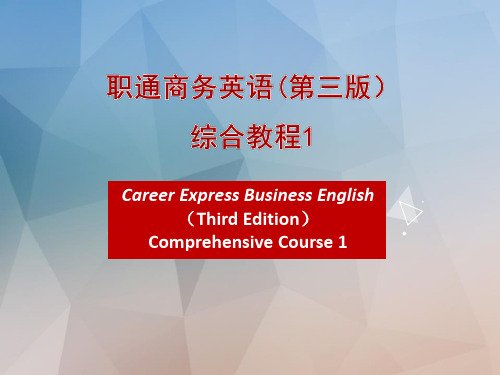
2 E-banking 4 Financial management 6 Credit card services
Introductory Remarks
The business of banking can be broadly defined as wise management and circulation of all kinds of money in the best interest of every unit of money. Today, a bank is a financial intermediary that offers a wide range of services to meet their customers’ financial needs. Two fundamental banking services are accepting deposits and making loans. Other services include payment services; deposit and lending services; investment, pensions and insurance services and e-banking.
Warming-up Discussion
Before you read, work in pairs and discuss these questions. (1) What do you know about banking services? (2) What role do you think banking plays in our lives?
Banking also includes a great variety of additional products and services that meet customers’ financial needs. A few of these products and services include investment products, pensions and insurance services, and foreign exchange services.
大学英语综合教程1Unit7WhatAnimalsReallyThink

大学英语-综合教程1-Unit-7-What-Animals-Reall y-ThinkUnit 6 What Animals Really Think1. controversy: [U] [C] + over / about / oneg. There was a heated ~ over the building of the bridge.I was engaged in a ~ with / against her on the issue.contradiction: 矛盾 A is in contradiction with B.contradictory (adj.) A and B are contradictory.2. consciousness [U] 知觉,意识※conscious: adj. = awareeg. He is conscious of his mother’s anger.※conscience: [U] [C] 良心eg. have a clear ~ / have a guilty ~※conscientious: adj.eg. a conscientious worker3.explore①examine thoroughly, learn abouteg. to ~ the possibility of crossing the river.②travel over an area for the purpose of discoveryeg. to explore space / to explore a place on foot4.encounter (fml): come across, meet…unexpectedlyeg. We encountered a girl selling sea shells on the sea shore.※encounter: n. 遭遇eg. the ~ with enemiesConfront be confronted with…遭遇5. convince: make sb feel sure by the use of argument or evidence~ sb of sth / ~ sb that…使人相信→be convinced of / be convinced that…确信※convincing: adj. a ~ speech※convinced: adj. 有坚定立场的※convincible: adj. 可被说服的“The stories they tell us reveal whatanimal intelligence”1.2. We’6.make / do a deal (with sb.)deal: v.经营,买卖--- He runs a shop that deals in sea food.n.(colloq.)交易,成交---It’s a deal.dealer: trader, merchant7.only to (do sth.): do sth with a surprising, disappointing resulteg. He worked out a plan with great efforts, only to be ridiculed by the others.8.negotiate: ~ with sb / ~ to do… / ~ for…eg. The two companies both believe that they need to ~ to share the market.The workers will ~ for a pay increase of 4%.9.. relieve: (vt.) free sb from pain, anxiety, etc., ease sb's paineg. Drugs can relieve much of the pain.relieve sb. of stheg. A part-time job can relieve you of the financial burden.10. “careful bargainer that she was…”▲as, that, though引导的原因状语或让步状语从句eg.①Intelligent as / though he is, Tim is quite modest.②Hard as he tried, he couldn’t learn French well.③Child that he is, he can ride a horse.11. undertake: carry out, take upon oneself (a task)To ~ responsibility / a taskTo ~ the role of Juliet.12. expand: 数目,尺寸,量上的增长,金属的膨胀,领土的扩张extend: 比喻意义上的延长,扩展,“时、空”之延长/拓展The extended meaningExtend my stay in ShanghaiExtend one’s vision13. switch ( to sth…) 转换变成eg. He used to play tennis, but now he has switched to golf.Switch sth. on / off 接通、切断→switch n. 开关,闸14. in sb’s interest(s): in sb’s favour, to sb’s advantageeg.It will be in your interests to undertake this task.to work in the interests of humanity.15. go far: help very much, achieve much successeg. Mike is diligent and intelligent. He will go far.This is a new problem. I don’t think the old method will go far.16. judgment①opinion about stheg.—What has caused his failure in the examination, in your ~?—My ~ is that he has made a wrong ~ of his own ability?②the ability to form valuable opinions and make good decisionseg. He is promoted because of his excellent judgment.17. emergencyeg.※to make an ~ landing 紧急降落※In an ~, call 110.※The ~ services are the fire brigade, the police, and the ambulance service.18. halt①vi. / vt. Stop②vi. hesitate→to halt between two opinions③n. stop →come to a halt④halter: 缰绳19. release: (vt.) release sb. / sth. from…to ~ a bird from the cageto ~ his hold of the ropeto ~ a new film20. evidence①[U] ~ for …/ ~ of… / ~ that- / ~ to do…②pl.evidences 迹象,痕迹21. deceive: ~ sb. / ~ sb. into doing …The cheat deceived the old lady into buying the dyed little dog.22. inaccessible: beyond reach, unreachable, unavailable→accessiblea painting not accessible to the public→access: n. 通路an access to the castle23. give in ( to sb. / sth. ) = yield to sb. / sth.= surrender to…= submit to…= be subjected to…eg. Never give in to temptation!The parents gave in to the boy’s tears and bought him a computer.24. wipe out: get rid of, destroyeg. The village was wiped out in the flood.25. horizon: 海平线,水平线眼界,见识limit of one’s knowledge or experience horizontal line→vertical line。
新世纪大学英语综合教程1 课后答案 第二版 秦秀白Unit 7 Interpersonal Re
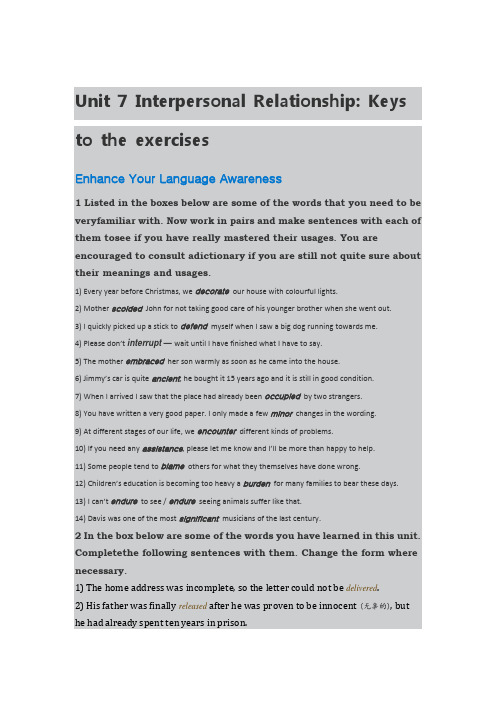
Unit 7 Interpersonal Relationship: Keys to the exercisesEnhance Your Language Awareness1 Listed in the boxes below are some of the words that you need to be veryfamiliar with. Now work in pairs and make sentences with each of them tosee if you have really mastered their usages. You are encouraged to consult adictionary if you are still not quite sure about their meanings and usages.1) Every year before Christmas, we decorate our house with colourful lights.2) Mother scolded John for not taking good care of his younger brother when she went out.3) I quickly picked up a stick to defend myself when I saw a big dog running towards me.4) Please don’t interrupt —wait until I have finished what I have to say.5) The mother embraced her son warmly as soon as he came into the house.6) Jimmy’s car is quite ancient; he bought it 15 years ago and it is still in good condition.7) When I arrived I saw that the place had already been occupied by two strangers.8) You have written a very good paper. I only made a few minor changes in the wording.9) At different stages of our life, we encounter different kinds of problems.10) If you need any assistance, please let me know and I’ll be more than happy to help.11) Some people tend to blame others for what they themselves have done wrong.12) Children’s education is becoming too heavy a burden for many families to bear these days.13) I can’t endure to see / endure seeing animals suffer like that.14) Davis was one of the most significant musicians of the last century.2 In the box below are some of the words you have learned in this unit. Completethe following sentences with them. Change the form where necessary.1) The home address was incomplete, so the letter could not be delivered.2) His father was finally released after he was proven to be innocent (无辜的), but he had already spent ten years in prison.3) Did he give you permission to use his computer?4) All rooms in this building are rented to students because it is closeto their university.5) When she recalled her miserable days during the war, my motherwould cry bitterly.6) When I told George that Maggie had refused to help, he exploded and walked out without saying anything.7) She pressed her dress smooth using a hot iron.8) With a(n) motion of his hand, he urged us to follow him.9) As soon as she accepted the job, Janet started working with great enthusiasm.10) Though she is over seventy, she is blessed with excellent health.11) The old woman was hurt so deeply by what his son had said thatshe trembled with rage.12) Just complete the attached form and return it in the envelopeprovided.13) The waiter inquired whether we would like to sit near the window.14) You’ve been working all morning — you now deserve a rest.3 In the boxes below are some of the expressions you have learned in this unit. Doyou understand their meanings? Do you know how to use them in the propercontext? Now check for yourself by doing the blank-filling exercise. Change theform where necessary.1) She is a very responsible lady; with her in charge, I am sure nothingwill go wrong.2) We were half way on our journey when our car broke down.3) I have lost my watch and I am quite certain I lost it on my way to thecomputer room.4) The child is very independent. He wants to make all importantdecisions by himself.5) This little girl is a dancing genius; she could dance in time to themusic as young as three years old.6) Our manager has to deal with all kinds of complaints the staffmembers make.7) She knew her subject from top to bottom and breezed through theexam in less than an hour.8) Several days had gone by before we found the missing dog.9) To my surprise, I was given the job, even though I had sent in myapplication rather late.●Increasing Your Word Power1 A synonym is a word that has the same or nearly the same meaning as anotherword. Now identify synonyms by matching a word in Column A with anotherin Column B. Then complete the sentences with an appropriate word either inColumn A or in Column B. Change the form where necessary.1) They endured hours of backbreaking work in miserable conditions.2) Some of the boys in our class are going to skip today’s class; I wonderhow our teacher will respond to it.3) She is a teacher and spent most of her career in New York.4) The wearing of seat belts is required by the law.5) S ally didn’t feel quite well, but still dragged herself wearily out ofbed at fiveo’clock that morning.6) This new play was directed by Mike Johnson, assisted by Sharon Gale.7) It’s her birthday party so I need a gift of some sort to take along.8) Tom is a stubborn child who won’t obey his mother.9) I’m not joking; I’m serious.10) From the house come bursts of merry laughter.11) Our tour departs from Heathrow Airport on 31 March and returns16 April.12) Barbara scolded her son for being so naughty before the honourable guests.13) There are no significant differences between the two groups ofstudents in terms of their IQ.2 An antonym is a word that means the opposite of another word. Now identifyantonyms by matching a word in Column A with another in Column B. Thencomplete the sentences with an appropriate word either in Column A or inColumn B1) With no thought for his own safety, he ran into the burning buildingto save the child.2) He waited the whole day for her to call him back, but no phone callcame. He was so annoyed that he went to bed miserably.3) Listen! The girls are singing cheerfully in the next room. They mustbe having a lot of fun together.4) He did his work carelessly. That’s why he made so many mistakes.5) Jim knew absolutely nothing about the business when he joined thefirm.6) He looked round desperately for someone to help him.7) The news report does not mention who is to blame for the trafficaccident.8) He left his hometown as a poor, working class boy and returned as anextremely wealthy man.9) I don’t like the boring / dull atmosphere in our class; I thinkeveryone should try to be more active in class.10) She wanted to be the first woman to climb Mount Everest, andshealmost succeeded.3 The words in the box below can be used both as nouns and as verbs. Useeither the noun form or the verb form of the words to complete the followingsentences. Change the form where necessary.1) I got so mad with him that I slapped him hard across the face; I’mstill feeling sorry for what I did then.2) On my birthday one of my friends gave me a beautiful doll as a(n)present.3) She finally solved the problem! A smile lit up her face.4) The little donkey struggled under a heavy burden.5) He was so angry that he reached forward and gave her a(n) slap onthe cheek.6) Janet presented the director with an expensive painting as a partinggift from us all.7) I ordered a chicken and some beer and started eating and drinkingby myself.8) The lake was bathed in the soft light of the moon.9) The government is spending millions of dollars in its attempt to combat drug abuse (毒品滥用).10) She motioned me to come closer and slipped something into myhand.11) The strain on the cables (绳缆)supporting the bridge is enormous.12) You can place an online order and they will deliver the goods to thedoor.13) They strained the rope between the two posts.14) I don’t want to burden you with my problems.15) With a sweeping motion of his hand, he said, “Follow me closely.”16) Helen volunteered to have the New Year party at her house this year.17) The troops were exhausted after months of fierce combat.18) She now helps in a local school as a(n) volunteer three days a week.4 Did you notice the suffixes -ness, -ment in words such as illness, disappointmentin this unit? The suffix -ness can be put after many adjectives to form nouns, while -ment can be added to many verbs to form nouns.Now form nouns byadding -ness or -ment to the words given in the table and write down theChinese meaning for each.Adjectives / Verbs Suffixes Nouns Chinese Meaningsaccomplish-ment / -ness accomplishment 成就;造诣;完成adjust adjustment 调节;调整;校正appoint appointment 约会,约定;任命,委派aware awareness 意识;知道;觉悟calm calmness 平静;安静;镇静competitive competitiveness 竞争;竞争力develop development 形成;开发;发展effective effectiveness 效力;有效性encourage encouragement 鼓励;赞助;促进impulsive impulsiveness 冲动;推动;驱使Complete each of the following sentences with a proper word you have thusformed.1) There has been an increasing awareness that care of the elderly hasbecome a social problem.2) We need encouragement from each other in order to complete sucha huge project.3) With so many caregivers around her, the old woman feels a sense ofsecurity and calmness.4) To ensure competitiveness in market, the company spares no effortto improve the quality of its products.5) We are very proud of the accomplishments that we have made overthe past few years.6) If you want to see the director, you need to make a(n) appointment with him first.7) When travelling abroad, you should make necessary adjustments tothe cultural differences.8) Take your time and think about it twice so as to avoid impulsiveness in your decision.9) A series of clinical trials (临床试验)are conducted to test the effectiveness of the newly developed medicine.10) There have been significant technological developments in thiscountry in the last two decades.Grammar in ContextStudy the following sentences that appear in this unit, paying special attention tothe italicized parts. Reflect on the grammatical function of the present participles,and group them into different types.1) a. Adverbial of time: 2, 4, 62) b. Adverbial of reason: 9, 103) c. Adverbial of result: 84) d. Adverbial of accompanying circumstances: 1, 3, 5, 7Task 1: Rewrite the following sentences using a present participle clause.1) He sat silent in the corner. He was reading his favorite novel.He sat silent in the corner, reading his favorite novel.2) When she saw the traffic light turn green, she quickly crossed the road.Seeing the traffic light turn green, she quickly crossed the road.3) As he has engaged in the research for many years, he is quite familiar withthe topic.Having engaged in the research for many years, he is quite familiar with the topic.4) He didn’t know where the supermarket was, so he went up to the policemanto ask for directions.Not knowing where the supermarket was, he went up to the policeman to ask fordirections.5) A new economic stimulus plan is said to be unveiled, and it leads to a surgein the stock market.A new economic stimulus plan is said to be unveiled, leading to a surge in the stockmarket.Task 2: Rewrite the following sentences to avoid ambiguity or danglingconstructions.1) Opening the window, a butterfly flew into my study.Opening the window, I saw a butterfly flying into my study.Or: When I opened the window, a butterfly flew into my study.2) Weighing almost 100 pounds, he lifted up the stone with one arm.Weighing almost 100 pounds, the stone was lifted up by him with one arm.Or: Although the stone weighed almost 100 pounds, he lifted it up with one arm.3) Idling about all day and indulging in games, the teacher flunked (使…不及格) the student in the final exam.Idling about all day and indulging in games, the student was flunked by theteacher in the final exam. 4) Having lived in the small county for thirty years, everything is familiar to the old man.Having lived in the small county for thirty years, the old man is familiar witheverything.5) Having received the Nobel Prize in literature, the media bombarded (向…连续提问) Mo Yan with questions of various types.Having received the Nobel Prize in literature, Mo Yan was bombarded withquestions of various types from the media.ClozeComplete the following passage with words chosen from this unit. The initial letterof each is given.Being a good boss has never been easy for me. The most difficult part is not about work, but about d ealing (1) with relationships at the workplace. As each and every employee in my company is s ignificant (2) to its development, I needto give enough a ttention (3) and care to everyone and to be approachable to all.At the start of the business, I encountered difficult situations and I was unsure what the best way was to handle them. For example, when an employee made a mistake, I hesitated about whether to s cold (4) him or her. Would I appear to be an i mpatient (5) boss to my employees if I did so? Would they continue to make mistakes if I was too lenient? Sometimes, I had to s ettle (6) disputes among the employees if they did not see eye to eye with each other on some tasks. This too was difficult. Should I b lame (7) any party or should I d efend (8) anyone? Howwould I bring them to see their differences and find solutions without h urting (9) each other? Sometimes I also e ncountered (10) difficult employees who seemedto feel m iserable (11) whatever I did for them. Life has never been easy, but I have learned the ropes along the way. The essential principle is to treat the employees s incerely (12), appreciate their contributions to the company and reward them accordingly. My employees are happy to have me as their boss, and are offering me all the a ssistance (13) they could. They have great e nthusiasm (14)for their work and have contributed significantly to the company’s development. TranslationTranslate the following sentences into English, using the words given in brackets.1) 直起身来,脚要跟上音乐拍子。
综合英语听力原文
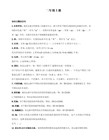
Woman: Did I tell you I'm going to China?
Man: China? Great.
Woman: Yes. I’m going to Shanghai on business. I have to
buy some gifts.
Still the most important difference between television and the board game is the interaction with others. Getting the family together to watch a show on television is nice; that is, if you can find a show on for the whole family. But playing a board game gives you the chance to learn, not only about the subject, but also about each other. Everyone is different, with their own views and unique ways of handling situations, giving each game a different outcome. One of the nicest parties I ever attended was one where we played a murder-mystery game called “How to Host a Murder.” We never knew what to expect next, and it was a wonderful way to get to know everyone.
(全新版)大学英语《综合教程》第一册Unit7

• 12. pull on: take hold of (sth.) and pull (it) with strength • Examples: The child pulled on his mother's coat wanting to leave. • Sophia pulled on the rope, shouting "help." • 13. with all one's strength: with all one's power • Examples: With all his strength he removed the piano to the next room. • She opened the door with all her strength and ran out of the house. • 14. explode: burst with a loud noise • Examples: The clap of thunder exploded overhead, which frightened the child into crying. • A bomb exploded at one of London's busiest railway stations this morning.
• 6. out of the way: at a distance from the usual route; in a state or condition so as not to hinder (used after a verb) • Examples: Step out of the way and let me handle the stone. • The house is well out of the way on the back road. • 7. resume: begin (sth. or doing sth.) again after a pause • Examples: The search for the missing pilot is expected to resume early today. • We'll stop now and resume (working) at two o'clock. • They stopped talking for a moment to see where the noise was coming from and then resumed their conversation. • 8. mess around / about: (infml) spend time playing or doing things with no particular purpose • Examples: He spends his weekends messing around in his boat on the Thames. • The kids spent all day Sunday just messing around.
新世纪大学英语(第二版)综合教程第一册Unit 7.答案
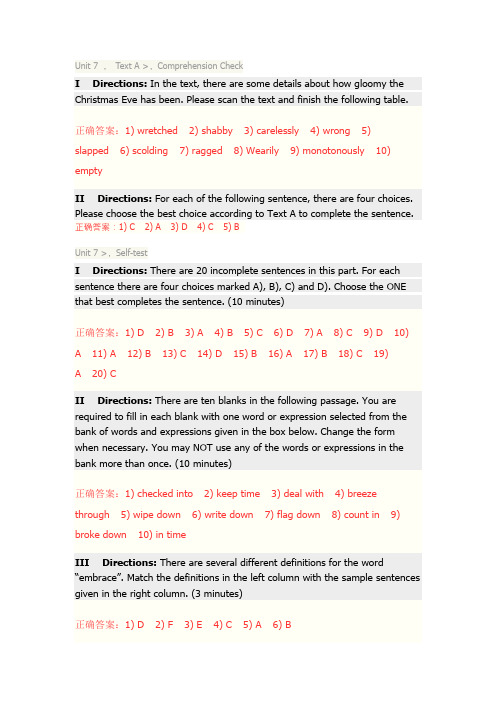
Unit 7 ,Text A >,Comprehension CheckI Directions: In the text, there are some details about how gloomy the Christmas Eve has been. Please scan the text and finish the following table.正确答案:1) wretched 2) shabby 3) carelessly 4) wrong 5)slapped 6) scolding 7) ragged 8) Wearily 9) monotonously 10) emptyII Directions: For each of the following sentence, there are four choices. Please choose the best choice according to Text A to complete the sentence. 正确答案:1) C 2) A 3) D 4) C 5) BUnit 7 >,Self-testI Directions: There are 20 incomplete sentences in this part. For each sentence there are four choices marked A), B), C) and D). Choose the ONE that best completes the sentence. (10 minutes)正确答案:1) D 2) B 3) A 4) B 5) C 6) D 7) A 8) C 9) D 10)A 11) A 12)B 13)C 14)D 15) B 16) A 17) B 18) C 19)A 20) CII Directions: There are ten blanks in the following passage. You are required to fill in each blank with one word or expression selected from the bank of words and expressions given in the box below. Change the form when necessary. You may NOT use any of the words or expressions in the bank more than once. (10 minutes)正确答案:1) checked into 2) keep time 3) deal with 4) breeze through 5) wipe down 6) write down 7) flag down 8) count in 9) broke down 10) in timeIII Directions: There are several different definitions for the word “embrace”. Match the definitions in the left column with the sample sentences given in the right column. (3 minutes)正确答案:1) D 2) F 3) E 4) C 5) A 6) BIV Directions: Complete the following sentences by using the correct forms of the words that have been given in brackets. (2 minutes)正确答案:1) Feeling 2) Not knowing 3) Hearing 4) leaving 5) reading。
新标准高职高专公共英语 综合教程1 Unit7-10课文翻译

4。在电视广告上的奇迹的饮食会帮助我减肥
浏览任何电视频道上看到广告最新减肥药丸或运动机。他们承诺一个奇迹般地减肥。但通
常的产品,不辜负他们的承诺,甚至可以是危险的。不要浪费你的钱,他们。
最好的建议
什么是最好的方式得到合适?吃helthily和保持食物平衡有氧和肌肉锻炼。让您的健康的
一个小羽毛的动物很快就交给他的新主人,谁叫他凯西。
第一句凯西学会了说“我的眼镜在哪儿?“其次是“我的钱包?“当帕特开始搜索表和开抽屉
,凯西说,“我的眼镜在哪儿?我的皮包呢?“
凯西不喜欢生活在一个笼子里,所以Pat经常让他免费的房子。“有趣的是他,”她告诉安妮。
“它使整个地方感觉更好。”
亨利叔叔很快抓住妈妈的精神和打电话给我去寻找一个完美的树在树林里。
很快房子闻起来清新愉快的大家都在忙着准备晚餐,我真的开始喜欢这个不寻常的圣诞节。
甜点被遗忘了,直到妈妈走出来,最后的惊喜——一个圣诞布丁!“圣诞快乐。妈妈,”妈
妈说。
我的天!“奶奶喘着气。“我还没有看到一个燃烧的布丁,自从我离开英国。这是最好的圣
学校和他们的工作被拒绝了一次又一次,查尔斯舒尔茨。他创造了“花生”的漫画和小卡
通人物,从来没有成功地踢足球,查利·布朗
unit 9
我父亲去世后1947,母亲去工作来支持我们。在我读完了高中,我期待着和朋友们一起过
圣诞节。但在圣诞节前两星期,妈妈告诉我我们要去奶奶家度假。
我的祖母和亨利叔叔住在一个农场15英里的小镇。他们没有电和自来水,他们似乎没有圣
好的或坏的。
这里有四个最常听到的神话变得健康。
1。如果我只是吃得少,我要减肥
许多人只注重他们的食物量消耗的每一天。他们没有注意他们的饮食。所以他们可能吃
邱东林_基础综合英语(研究生)_1至7单元完整版-课文翻译
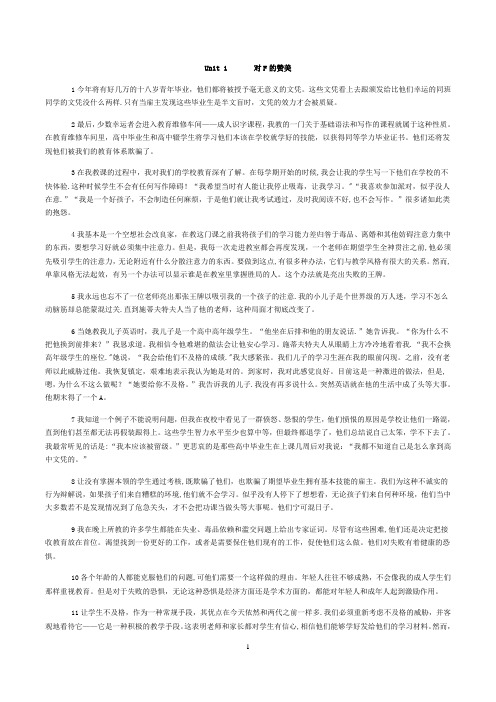
Unit 1 对F的赞美1今年将有好几万的十八岁青年毕业,他们都将被授予毫无意义的文凭。
这些文凭看上去跟颁发给比他们幸运的同班同学的文凭没什么两样.只有当雇主发现这些毕业生是半文盲时,文凭的效力才会被质疑。
2最后,少数幸运者会进入教育维修车间——成人识字课程,我教的一门关于基础语法和写作的课程就属于这种性质。
在教育维修车间里,高中毕业生和高中辍学生将学习他们本该在学校就学好的技能,以获得同等学力毕业证书。
他们还将发现他们被我们的教育体系欺骗了。
3在我教课的过程中,我对我们的学校教育深有了解。
在每学期开始的时候,我会让我的学生写一下他们在学校的不快体验.这种时候学生不会有任何写作障碍!“我希望当时有人能让我停止吸毒,让我学习。
"“我喜欢参加派对,似乎没人在意.”“我是一个好孩子,不会制造任何麻烦,于是他们就让我考试通过,及时我阅读不好,也不会写作。
”很多诸如此类的抱怨。
4我基本是一个空想社会改良家,在教这门课之前我将孩子们的学习能力差归咎于毒品、离婚和其他妨碍注意力集中的东西,要想学习好就必须集中注意力。
但是,我每一次走进教室都会再度发现,一个老师在期望学生全神贯注之前,他必须先吸引学生的注意力,无论附近有什么分散注意力的东西。
要做到这点,有很多种办法,它们与教学风格有很大的关系。
然而,单靠风格无法起效,有另一个办法可以显示谁是在教室里掌握胜局的人。
这个办法就是亮出失败的王牌。
5我永远也忘不了一位老师亮出那张王牌以吸引我的一个孩子的注意.我的小儿子是个世界级的万人迷,学习不怎么动脑筋却总能蒙混过关.直到施蒂夫特夫人当了他的老师,这种局面才彻底改变了。
6当她教我儿子英语时,我儿子是一个高中高年级学生。
“他坐在后排和他的朋友说话.”她告诉我。
“你为什么不把他换到前排来?”我恳求道。
我相信令他难堪的做法会让他安心学习。
施蒂夫特夫人从眼睛上方冷冷地看着我.“我不会换高年级学生的座位."她说,“我会给他们不及格的成绩."我大感紧张。
- 1、下载文档前请自行甄别文档内容的完整性,平台不提供额外的编辑、内容补充、找答案等附加服务。
- 2、"仅部分预览"的文档,不可在线预览部分如存在完整性等问题,可反馈申请退款(可完整预览的文档不适用该条件!)。
- 3、如文档侵犯您的权益,请联系客服反馈,我们会尽快为您处理(人工客服工作时间:9:00-18:30)。
Unit 7 The Fun They HadMain idea:This narrative story is a science fiction telling a story happening in the year of 2157. Margie and Tommy found a book in 21st century and they know something from the book about education in 21st century. Also, from the dialogue between Margie and Tommy, we, the people in 21st century know something of the education in the future predicted and imagined by the author. Structural AnalysisThis text can be divided into three parts.Part I (paragraph 1):This paragraph, which serves as the background of the story, tells us the time, characters, and the real book around which the story evolves.Part II (paragraphs 2-30):This part tells the story: Margie’s school life and school life of hundreds years ago she got from a book.Part III (paragraphs 31—35):This part tells Margie’s schoolroom, the mechanical teacher and Margie’s psychological activities Text Explanationhead1) lead; be at the front of; be at the top ofE.g.: The president’s car headed the procession.This canyon heads the list of natural attractions.2) be in charge of; take charge ofe.g.: The sales director heads a team of 20 representatives.crinklyhaving many thin folds; (of hair) curlye.g.: My shirts were all crinkly when I got them out of the suitcase.Her hair is a bit crinkly, which makes her look much prettier.be supposed to1) have a duty or responsibility to do sth.E.g.: Everybody is supposed to bring a bottle to the party.You are not supposed to smoke in here.2) be generally considered to be; have the reputation of beingE.g.: I haven’t seen it myself, but it is supposed to be a very good film.…and it was awfully funny to read words that stood still instead of moving about the way they were supposed to—on a screen…and it was very amusing to read words that were motionless instead of moving the way they ought to – on a screenWhen you’re through with the book, you just throw it away, I guess.—When you have finished reading the book, you merely throw it away, I believe.When you have finished reading the book, you merely cast it away, I believe.through1) in at one side, end, or surface, and out at the other; all the waye.g.: The guard at the gate wouldn’t let us through.Does this train go right through to London?2) from the beginning to the end; to completione.g.: Have you read the letter right through?You should read the article through before you translate it.scornfulshowing contempt for;e.g.: His scornful laugh greatly embarrassed me.His scornful dismissal of the democratic process showed that he did not support it. What's there to write about school?This is a rhetorical question, which calls for no answer. A positive rhetorical question is negative in meaning. The rhetorical question here means: There is nothing at all to write about school. mechanical1) of or moved, worked, or produced by machinerye.g.: That factory manufactures a variety of mechanical products.Being a mechanical genius, that man is at home in mechanical applications.2) Done without thought or feeling; (done) from habit rather than wille.g.: He greeted me in a mechanical way by using mechanical compliments.superior:1) of a higher rank or class; better in quality or valuee.g.: Of the two books, this one is superior to that one2) of high qualitye.g.: This is a very superior make of car.Superior goods are very popular among the customers.regular:1) happening or appearing with the same amount of time or space between each one and the next; not varyinge.g.: Plant the seed at regular intervals.2) happening, coming or doing something again and again at the same times each day, week, month, etce.g.: We keep regular working hours.Mr. Smith is a regular customer of the small store.nonchalantly:indifferently, coldly, not feeling excitede.g.: He reacted nonchalantly to my suggestion.He treated me nonchalantly when I visited him.tuckv 1 (a) ~ sth into sth; ~ sth in/up, push or fold or turn the ends or edges (of cloth, paper, etc) so that they are hidden or held in place; draw (sth) together into a small space 将(布、纸等)的端部或边缘掖好、叠拢或卷起(使之看不见或固定住);将(某物)缩拢起来塞入狭小空间: e.g. tuck your trousers into your boots.He tucked up his shirt-sleeves.The nurse tucked her hair (up) under her cap.dispute1) (about, over, with) argue about sth. Esp. angrily and for a long timeThe two governments disputed over the ownership of the territory.The question was hotly disputed in the Senate.2) Disagree about or question the truth or correctness ofI dispute the Minister’s figures—the true cost of the project is much higher.adjustv 1) put (sth) into the correct order or position; alter (sth) by a small amount so that it will fit or be right for use; regulate 整理; 校准; 调准; 校正:She carefully adjusted her clothes and her hair before going out.adjust the rear mirror,2)~ (sth/oneself) (to sth) become or make suited (to new conditions); adapt 使适合(新环境等); 适应:The body quickly adjusts (itself) to changes in temperature.adjustable adjadjustmentlight up1) ignite; (cause to ) start to burn; give light toe.g.: The fire won’t light up.The stage was lit up by several powerful spotlights.2) cause to become bright with pleasure or excitement.e.g.: Suddenly, a smile lit up her face when she heard the news.Her face lit up with joy when she saw him coming.ExercisesParaphrase:1. Her mother asked the County Inspector to come over.2. The mechanical teacher finished the calculation of the mark very quickly.3. Tommy looked at Margie with an air which suggested he knew far better about school than others.4. A teacher, a computerized teacher on net, has to be changed slightly so as to be suitable for each boy and girl to learn from.Grammar:1.The usage of articles;2.“It … to do something” pattern.Translation:1. Yesterday a government delegation headed by the Minister of Foreign Affairs arrived in South Africa and began a three-day friendly visit to the country.2. It is awfully funny and splits your sides with laughter to observe these caricatures which satirize social ills.3. Computers are one of the most useful teaching aides, for all your lessons as well as all the questions asked and all the answers provided can be shown on a screen.4. As soon as his mother fell ill suddenly the day before yesterday, Xiao Zhang sent for a doctor, who came and diagnosed and treated his mother.5. He failed in the college entrance examination last year, but he did not feel disappointed. Instead, he continued to study hard, passed the examination successfully and became a student in a famousuniversity this year.6. There are many English words that this middle school student cannot pronounce correctly. Therefore, he has to make great effort to learn the phonetic symbols well and acquire standard English pronunciation.7. In this new ear marked by knowledge explosion and information explosion, we have to pursue constant study and take particular care to renew our knowledge. Only thus, can we become adjusted to the requirements of our specialized work.8. With his shirt tucked into the top of his trousers and a leather bag tucked under his arm, the boy looked just like a boss.9. Although she is only eight years old, the little girl is already very good at calculating fractions. No wonder her parents feel very proud of her.10. All the neighborhood have heard about the news, but you haven’t. Don’t you think it is very strange.Text II The LaugherMain idea:In this essay, the author introduces to the readers his occupation—a laugher. Being good at all kinds of laughter and portraying gaiety in work, the author, however, does not like his job and does not feel happy at all.Questions for discussion:1. He thinks that the nature of all the professions is clear and needs no further explanation.2. His talents in the field of mime and elocution are not good enough to meet the requirements of an actor.3. He is most probably a professional laugher, imitating the laughter of different kinds of people and of different occasions.4. He wants to stress that skill comes from practice.5. They do not feel at home in punch lines, as a result, their performance may fail to entertain its audience.6. He feels sad because he cannot change or control the way that things will happen.7. Like a pessimist, the author condemns his job because he thinks that it results in more pain than pleasure.8. He goes back to normal, and in fact the feels happy because he does not have to play the fool. Memorable QuotesJohann Wolfgang von GoetheGerman poet, novelist, playwright, courtier, and natural philosopher, one of the greatest figures in Western literature. In literature Goethe gained early fame with The Sorrows of Young Werther (1774), but his most famous work is the poetic drama in two parts, FAUST.Sir Francis Bacon (later Lord Verulam and the Viscount St. Albans) was an English lawyer, statesman, essayist, historian, intellectual reformer, philosopher, and champion of modern science.。
